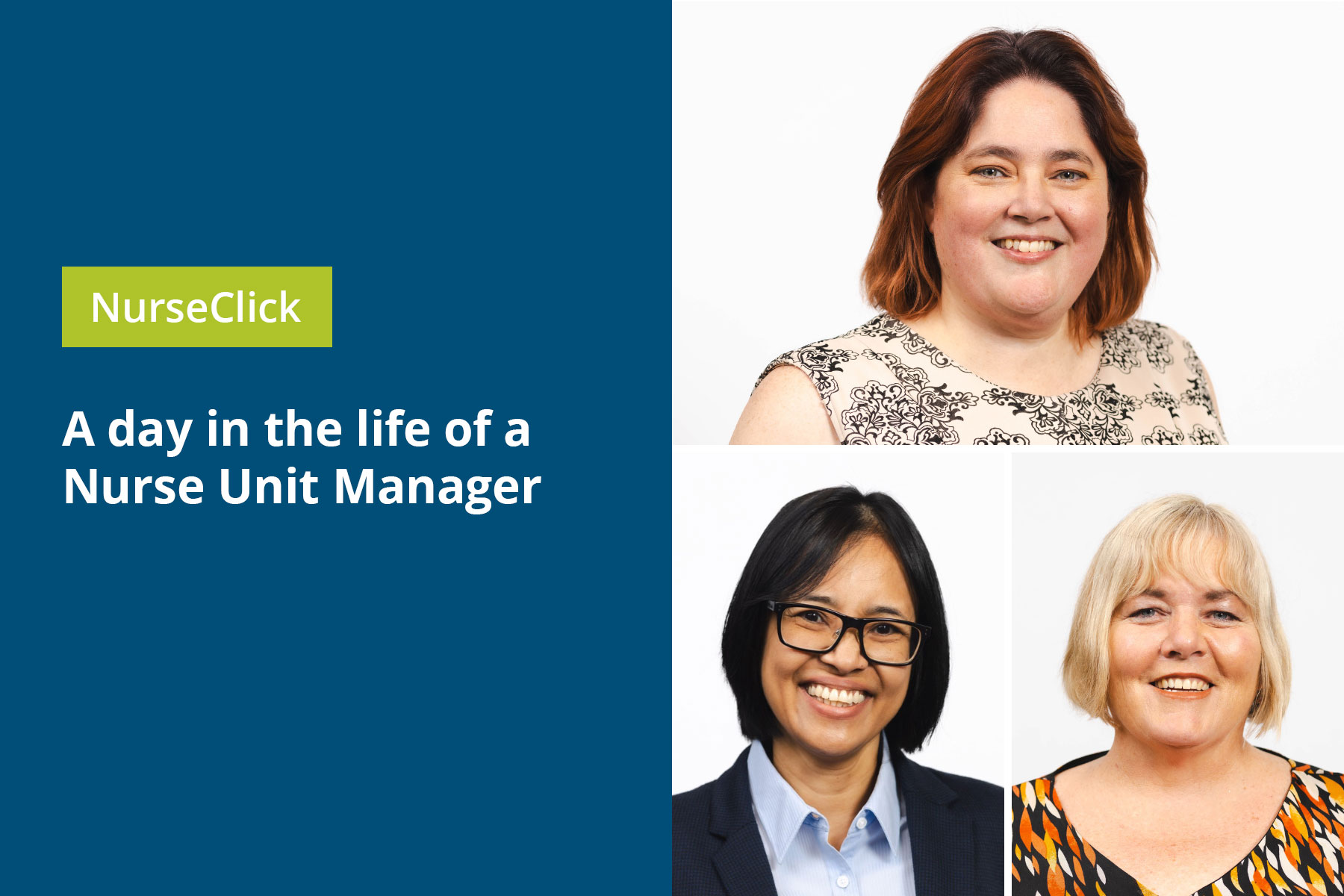Nurse Unit Managers (NUM) are an essential part of healthcare teams, blending a unique mix of clinical expertise and leadership acumen. No two Nurse Unit Manager roles are the same, with every leader facing unique responsibilities and requirements shaped by their specific work setting and speciality.
To showcase the diversity of the role of NUM, three alumni of our Nurse Unit Manager Leadership Program share insights into their day-to-day lives. One manages a bustling urban emergency department, another oversees a rural community health service, demonstrating the adaptability required in remote settings, and the third leads a specialised stroke unit, coordinating cutting-edge clinical trials. Together, they offer a glimpse into the wide range of paths a career as a Nurse Unit Manager can take, underscoring the role’s pivotal importance and the dynamic opportunities it presents.
In this article, you can read stories from:

Erlinda Baker MACN
In my role as an Acting Nurse Unit Manager, I generally follow a set schedule, but there are days when I need to be flexible and attend to unexpected tasks. I typically work from 8:00 AM to 4:30 PM. At the beginning of my shift, I receive an update from the Associate Nurse Unit Manager (ANUM). During this update, we discuss any urgent issues, our daily staffing and our workflow. I read through patient documentation to prepare for our Multi-Disciplinary Team (MDT) meeting, which takes place at 8:30 AM.
Throughout the day, I attend three to five meetings. The MDT meeting is the first, during which we review each patient’s progress, clinical management and discharge plans. We also discuss if any concerns need escalation. The DOS 2 and DOS 3 meetings take place via Zoom. In DOS 2, we discuss bed flow and staffing situations within each unit in the organisation. I have morning tea before the DOS 3 meeting, an organisation-wide meeting with representatives from different departments. During the DOS 3 meeting, we discuss our organisational readiness for the day and celebrate any successes.
Lunchtime is at 12:30pm, and if time permits, I participate in our safety huddle at 1pm. After that, I reviewed the agenda for the committee meeting scheduled for 2pm, which lasts an hour.
Between meetings, I check and respond to emails and phone messages. I also review RiskMan, our risk management and clinical incident reporting platform. Incidents are examined, investigated, and resolved through document reviews, follow-up phone calls, emails, or face-to-face discussions. To break the monotony of paperwork, I make informal rounds to check in with staff and chat with patients and their families. These help me reset.
From 3pm onwards, I continue with paperwork. I update our time card management system, sign and send documents related to staff leave, absences, and amendments to previous pay, and approve requisitions for supplies. I also review other invoices and expenses, sign them, and send them to the finance department for approval.
At 4:30pm, I finish my work for the day. The unit’s operation is my full responsibility. However, when I leave, I trust the ANUM’s ability to lead and manage in my absence. I ensure I leave work at work and do not bring it home.
About Erlinda Baker MACN
Erlinda is a registered nurse with 15 years of experience and holds a Certificate in Training & Assessment. Her clinical skills, knowledge and experiences encompass palliative care to high acuity care. She is no stranger to change, having experienced the amalgamation of units and the inception of new programs. She is currently employed by West Gippsland HealthCare Group as an Associate Nurse Unit Manager in the Medical Unit and as a Discharge Coordinator. She is client-focused and thrives on challenges and responsibilities to provide compassionate care always. Aside from being a nurse, she is also a seasoned traveller and a passionate Carlton Football Club supporter.

Alyson Martin MACN
The day really starts in earnest at the end of the last. I write my goals for the day including the basics and colour code the priority.
I am fortunate I only work 30 minutes’ drive from my home and enjoy the scenic view of the countryside as I drive in the morning, greeted by the sun rising. Officially I start at 7:30am however I am usually in the office by 6:30am. It is time to tick off those must do items and set the tone for the day and be prepared for the kaleidoscope of options that I encounter. I get to greet the team and listen to anything that is required to be shared, expressed, or debriefed.
In a rural facility the workload fluctuates between our services and often I can be not only the unit manager but the administration cover for meal breaks, the vaccinator, the wound care provider, the telehealth support, the problem solver for failed discharges and the advocate for the team and facility. I am the backfill option for all the areas of my unit where possible and value the opportunity to be clinically sound.
I may be requested to provide a room or a hot desk for executives, visiting clinicians or support the Allied Health or Mental Health team that share our building. I tend to be the Home Captain for the building and address any of the issues which arise with maintenance, fleet vehicles, access control and everything else in between.
The day can be filled with meetings, as we do twice daily bed huddles to ensure patient flow. I check CHAI, S4Hana, Smart Referrals, the Sirt Board, and myHR. I make note of the meetings for the day. I ensure the team has received a whereabouts email of my demands each week.
We have critical care review committees, executive, nursing executive, union, and project-funded meetings, and the list goes on. There is always the recruitment, the payroll, and the quality. I am often seen with a camera taking photos for workplace safety audits or cleaning up spills when members of the public have used inappropriate places to leave deposits better placed in the WC.
The aim is to be leaving at 4:30pm which is more like 5pm or later. Each day different but provide me with more fulfillment than I can express.
About Alyson Martin MACN
Alyson Martin MACN is a registered nurse specialising in advanced practice, immunisation, infection prevention and control, and leadership.
Alyson is a proud, passionate leader and advocate for the growth of nursing. She is dedicated to driving the recognition of nursing to the forefront of health care. She is committed to challenging and enquiring unapologetically for the improved wellbeing of all Australians.

Jennifer Cranefield MACN
A day in the life of a Nurse Consultant who manages a Stroke Clinical Trial Unit
Strokes are not a Monday to Friday, 9-5 kind of medical condition and coordinating clinical research around that fact while being constrained to a 9-5 routine sometimes feels like my work is a giant square peg being pushed through a small round whole. That being said, there are some predictable factors to my day:
My active trial participants come first.
Scheduled visits are the anchor to my day.
Everything else is flexible, unpredictable, sometimes challenging but always deeply rewarding.
I start my day with an informal team discussion looking at what scheduled participant visits we have booked in for the day and what new admissions we have had to the stroke unit overnight. We review these to see if any meet basic study criteria and discuss who will review these patients and what steps are needed to successfully randomise them to the study.
My morning is spent reviewing two new clinical trial protocols and completing sponsor site feasibility questionaries – these are much like a dating app profile – you want to sound attractive and capable yet not sell your soul on the first interaction! Tell them about your best features (yes, my centrifuge is refrigerated) but leave them guessing as to if it is a mid-century model or modern age tech– oh la la!
After a quick check in with my team to see how the recruitment of the first patient to our newest trial is going, I turn my attention to billing the sponsors for the trial activities completed in the previous month. Probably the least enjoyable task of the day and a great example of what nursing training doesn’t include (accounting skills), but it is necessary if I want to be able to have the funds to keep myself and my team employed.
Lunch, I’m ashamed to say, is a working lunch split between finishing off said invoices and a Zoom call with one of my study monitors to go over some data queries and training on a new system they wish to deploy.
The afternoon is filled with scheduled trial participant visits, follow-ups and phone calls. I love this part of my day as it is 100% participant-focused. I get to see and evaluate the impact (good and bad) of the intervention/treatment/medication we are trialing. This ‘fills my cup’ as I know we have made some very impactful advances to stroke care in the 10 years I have worked in this field, and I know we have more to come.
I round out my day with reviewing set meetings planned for tomorrow and the remainder of the week and re-prioritise these or delegate them based on my workload – a skill I’m still perfecting, but one I learned the importance of from the NUM course.
About Jennifer Cranefield MACN
Jennifer has been a registered nurse for over 24 years with clinical experience spanning all South Australian metropolitan health networks, from acute care to palliative care. She has spent the last 10 years working as a stroke trials co-ordinator at the Royal Adelaide Hospital. She has assisted in building the unit to become one of the leading stroke research units in Australia and now leads the unit as a Nurse Consultant.
Navigating the multifaceted and fulfilling career journey of a Nurse Unit Manager requires not just skill, but a deep commitment to personal and professional growth. We are here to support you every step of the way, sharing advice and expertise from those who’ve successfully walked this path, to ensure you have the knowledge and resources you need to thrive in your role.
Curious about what this rewarding career holds? What I Wish I Knew About Being a NUM provides insights from an experienced nurse leader, revealing the nuances and surprises of embarking on the role.
Taking your first steps into management? Our guide, Ten Tips for Transitioning from Clinical Nursing to Management, delivers practical advice to lay a solid leadership foundation.
And for those ready to deepen their impact and refine their leadership skills, our Nurse Unit Manager Leadership Program is designed to elevate your journey, fostering a community of leaders who not only excel in their roles but also drive meaningful change in health care.





